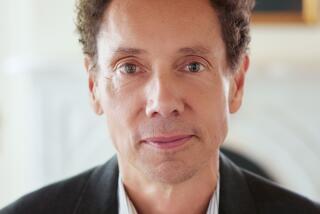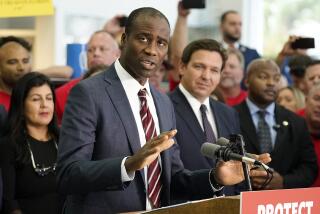Surveying a Problem With Polls
Urban legends are anecdotes so engaging, entertaining, anxiety-affirming or prejudice-confirming that people repeat them as true, even when they are not.
Their journalistic equivalent is the pithy “poll result” or “study finding” that so neatly encapsulates a social ill or point of partisan contention, that no talk-show host or stump orator can resist them. Ronald Reagan, for example, was so notoriously fond of dubious anecdotes that some of his close associates speculated that his years as an actor had rendered him utterly incapable of passing up a good line.
But that provenance-be-damned attitude hardly ended with the Great Communicator’s retirement.
CNN political analyst William Schneider, an authority on opinion polling, believes that highly charged political issues or campaigns are particularly prone to spin off fictional study results, which then take on a life of their own.
“Social Security is a classic case,” Schneider said. “There is a political legend that a ‘recent’ poll, which is never specified, showed that more young Americans believe Elvis is alive than expect to collect a Social Security check when they retire. Over the past few years, every conservative on earth and every Republican politician in Washington, including President Bush, has referred to this finding. They all just say, ‘polls or studies show this,’ but none ever has. Republicans go on citing this bogus finding because--whether it’s true or not--it has great value as political currency.”
This week, it was possible to watch another such journalistic legend being born. On Tuesday, the Wall Street Journal’s Leisure & Arts page published an article excerpted from a speech delivered one week ago by Bruce Cole, chairman of the National Endowment for the Humanities. In it, he decried the fact “that Americans do not know their history” and reflected on this collective amnesia’s particular perils in the wake of Sept. 11, whose memory he fears may even now be fading.
All fair points. But in their support Cole cited “a nationwide survey recently commissioned by Columbia Law School,” which he said, “found that almost two-thirds of all Americans think Karl Marx’s dogma, ‘From each according to his ability, to each according to his needs,’ was or may have been written by the Founding Fathers and was included in the Constitution.”
Clear; helpful; alarming. Plausible, even, given the popular taste for altruistic banality. Everything, in other words, that a good rhetorical point should be. The problem is that is not what the Columbia poll found.
It is, however, what the May 29 press release announcing the poll’s findings said. In fact, its first paragraph read: “Almost two-thirds of Americans think Karl Marx’s maxim, ‘From each according to his ability, to each according to his needs’ was or could have been written by the framers and included in the Constitution, according to.... “
Note the subtle shift from the release’s “could have been written” to Cole’s--or his speech writer’s--”may have been written.”
The announcement’s second paragraph quotes Columbia Law School professor Michael Dorf on the troubling implications of the Marx “finding” and points the reader to a column the professor has written for a legal Web site, Findlaw.com. In that column, Dorf wrote that “The survey found that 69% of respondents either thought that the United States Constitution contained Marx’s maxim, or did not know whether or not it did.”
That is further yet from Cole’s recitation of the finding.
But what of the actual poll, which asked a national sample of 1,000 respondents five yes-or-no questions about the Constitution?
In response to the query about whether the Marxist maxim is contained the document, 35% said yes; 31% said no; and 34% said “they did not know.”
Was Dorf entitled to conflate the yes and don’t-know respondents into a single alarming two-thirds? No, according to Schneider. “That is a total misinterpretation of what people mean when they tell a pollster they don’t know. When people say that, they mean ‘I have no idea.’ Choosing to interpret it as meaning ‘I think it may be true or could be true’ simply is misleading on the writer’s part.”
What it does do is add pungency to a finding Schneider described as “wholly unremarkable. It’s not at all surprising that about a third of respondents thought that is in the Constitution. Most people, for example, think the right to privacy exists in the Constitution, when no such right is enumerated anywhere in it.”
In fact, what is remarkable--and far more relevant at the moment--about the Columbia poll is what it shows Americans do know about their Constitution:
Fully 83% of the respondents recognized the first sentence of the 14th Amendment as part of the national charter, while 60% correctly understood that the president may not suspend the Bill of Rights in time of war. More than two-thirds were aware that Supreme Court justices serve for life.
The only other question the respondents flubbed was whether the court’s overturning of Roe vs. Wade would make abortion “illegal throughout the United States.” Less than a third of those polled correctly said it would not, since state statutes guaranteeing choice would remain on the books.
These facts notwithstanding, it is a safe bet that radio and television talk-show hosts, editorial writers and all the rest of the usually suspect soon will be sighing, groaning, sneering and raging over Americans’ inability to distinguish the thought of James Madison from that of Karl Marx. How long will it be before public education, the liberal media, humanism and single-parent families are blamed?
Commentary pages are the soft underbelly of American journalism. Their writers, however self-interested, are held to a different, which is to say lower, standard of proof because of their presumed expertise. In fact, they are responsible for regularly injecting false information of this sort into our public discourse. In the marketplace of ideas, as on the used car lot, caveat emptor still is the best policy.
Work in Progress
Leo Braudy is university professor and Bing Professor of English at USC and the author of, among other books, “The Frenzy of Renown”: “I’ve just finished a book on war and masculinity, which will be published by Knopf next spring. We’re really in the endgame, discussing illustrations and the bibliography, though it doesn’t yet have a title. But all of a sudden--at some point in this process--the right title will appear.
“It’s a study that stretches from the Middle Ages to the present and explores the way in which perceptions of masculinity have changed in relation to major wars, to changes in war technology, to changes in the idea of the state and how it wages wars and to changes in attitudes toward sexuality. Essentially, I’m tracking the metamorphic quality of ideas of masculinity. The result is a counter to ideas of innate masculinity or, for that matter, of innate femininity. Though not polemical, it’s an anti-sociobiological work because it attacks the overemphasis on the innateness of human nature by stressing its changeability.
“Essentially, it’s about the both/and rather than the either/or nature of our existence.”
More to Read
The biggest entertainment stories
Get our big stories about Hollywood, film, television, music, arts, culture and more right in your inbox as soon as they publish.
You may occasionally receive promotional content from the Los Angeles Times.










